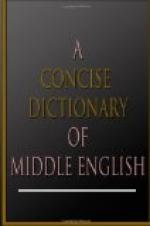S3.—SPECIMENS OF ENGLISH, Part III, ed. Skeat; from A. D. 1394-1579.
This book contains extracts from:—1. Pierce the Ploughman’s Crede, ll. 153-267, 339-565, 744-765, 785-823; 2. Hoccleve’s De Regimine Principum, stanzas 281-301, 598-628; 3. Lydgate, London Lickpenny, and the Storie of Thebes, bk. ii. ll. 1064-1419; 4. James I (of Scotland), the King’s Quair, stanzas 152-173; 5. Pecock’s Represser, pt. i. c. 19; pt. ii. c. 11; 6. Blind Harry’s Wallace, bk. i. ll. 181-448; 7. Chevy Chase (earlier version); 8. Malory’s Morte Darthur, bk. xxi. c. 3-7; 9. Caxton’s History of Troy; 10. The Nut-brown Maid; 11. Dunbar, Thistle and Rose, and Poem on being desired to be a Friar; 12. Hawes, Pastime of Pleasure, c. 33; 13. G. Douglas, Prol. to Aneid, book xii; 14. Skelton, Why Come Ye Nat to Courte, ll. 287-382, 396-756; Philip Sparrow, ll. 998-1260; 15. Lord Berners, tr. of Froissart, c. 50, c. 130; 16. Tyndale, Obedience of a Christian Man; 17. More, Dialogue Concerning Heresies, bk. iii. c. 14-16; Confutation of Tyndale, bk. iii; 18. Sir T. Elyot, The Governor, bk. i. c. 17, 18; 19. Lord Surrey, tr. of Aneid, bk. ii. ll. 253-382, 570-736, and minor poems; 2O. Sir T. Wiat, Three Satires, and minor poems; 21. Latimer, Sermon on the Ploughers; 22. Sir D. Lyndesay, The Monarchy, bk. iii. ll. 4499-4612, 4663-94, 4709-38; bk. iv. ll. 5450-5639; 23. N. Udall, Ralph Roister Doister, Act iii. sc. 3-5; 24. Lord Buckhurst, The Induction; 25. Ascham, The Schoolmaster, bk. i; 26. Gascoigne, The Steel Glas, ll. 418-470, 628-638, 750-893, 1010-1179; 27. Lyly, Euphues and his Ephoebus; 28. Spenser, Shepherd’s Calendar, November, December.




